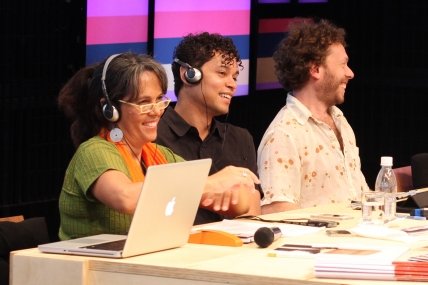Festival discusses the role of artist residencies
This Sunday, the final day of the intensive opening program of the 18th Contemporary Art Festival Sesc_Videobrasil, Artist Residencies were discussed. In the morning, a packed audience witnessed the meeting Hospitality and policies of mobility, as debaters discussed the importance of artist residencies to the sponsoring of art and to local development, and the challenges facing said residencies in a globalized world.
The meeting was mediated by the Chilean artist Amilcar Packer, and featured the American dancer and cultural producer, Aaron Cesar, director of the Delfina Foundation, a British organization focusing on exchange with Africa and the Middle East; the artist Annalee Davis, founder of the Fresh Milk cultural center, in Barbados, and the curator, founder and director of the RAW Material Company, in Senegal, Koyo Kouoh. Koyo is also a juror in this edition of Videobrasil.
Annalee Davis opened the panel by introducing Barbados as perhaps the world’s first globalized country due to its colonization history, as it attracted Britons, Brazilian Jews, Arabs, Indians and, more recently, Chinese. Despite its cultural plurality, the country suffers the stereotype of a tropical island dedicated to foreign tourism, an image Annalee sets out to question. The Fresh Milk center is based on a milk farm – which the artist believes to be a revolutionary hospitality gesture, considering the local slavery past –, and was created to enable experience exchange and help young artists to develop their productions. The facility functions as a gallery, studio, residency site, and promotes interaction between people from different countries; “The most important thing in life is human connections, and that is what Fresh Milk is doing,” said Annalee, who, apart from being an artist, considers herself a “creative activist.”
To Aaron Cezar, the Delfina Foundation’s priority is interpersonal relationships, more so than professional ones. Thus, eating and cooking are crucial activities at the facility, which supports artists at the beginning of their careers (among them William Kentridge, now internationally known and featured in São Paulo). He also noted how political barriers make it harder for people to meet, and mentioned Videobrasil’s importance in enabling Lebanese and Palestinian people to meet at the festival, seeing as transit between Middle Eastern countries is so difficult. “Sometimes, where public policies fail, contemporary art manages to yield results,” said Aaron, who also asserted that Delfina promotes contact between immigrant artists and populations, ultimately leading to processes of inclusion.
The curator Koyo Kouoh also discussed the barriers placed by countries on the transit of people based on who they are and where they come from, and as a case in point she showed artwork by artists who focus on this theme. She also said that even in Africa, these restrictions are increasing. Senegal, a country known for its openness (the word “teranga” means hospitality in wolof, and is used to define the local population) has just restricted the flow of people by requiring visas from people of all nationalities. The RAW Material Company breaks from that logic by offering residencies to artists, curators, writers and architects, lasting anywhere from one week to six months. “At first, our focus was on educational processes, and artists would repay by giving workshops to the local community; we used to promote this cultural exchange. Now, we are a hybrid philanthropic non-government organization,” said Kouoh, who opened space for a debate on sustainability and autonomy. The RAW Material Company also includes a gallery and a restaurant, which allow it to both sustain its line of curating and raise funds. “We have several partners and financers, and yet we take pride in our freedom,” says the curator and 18th Festival competitive show juror.
In the afternoon, the debate about the Residencies will continue with “Transnationality as a Horizon,” at 2:30 pm, with Gabriela Salgado, Ika Sienkiewicz and Mario Caro.



